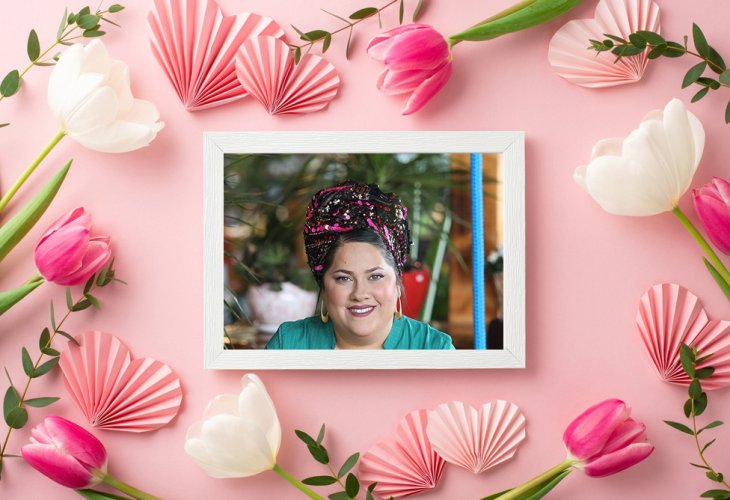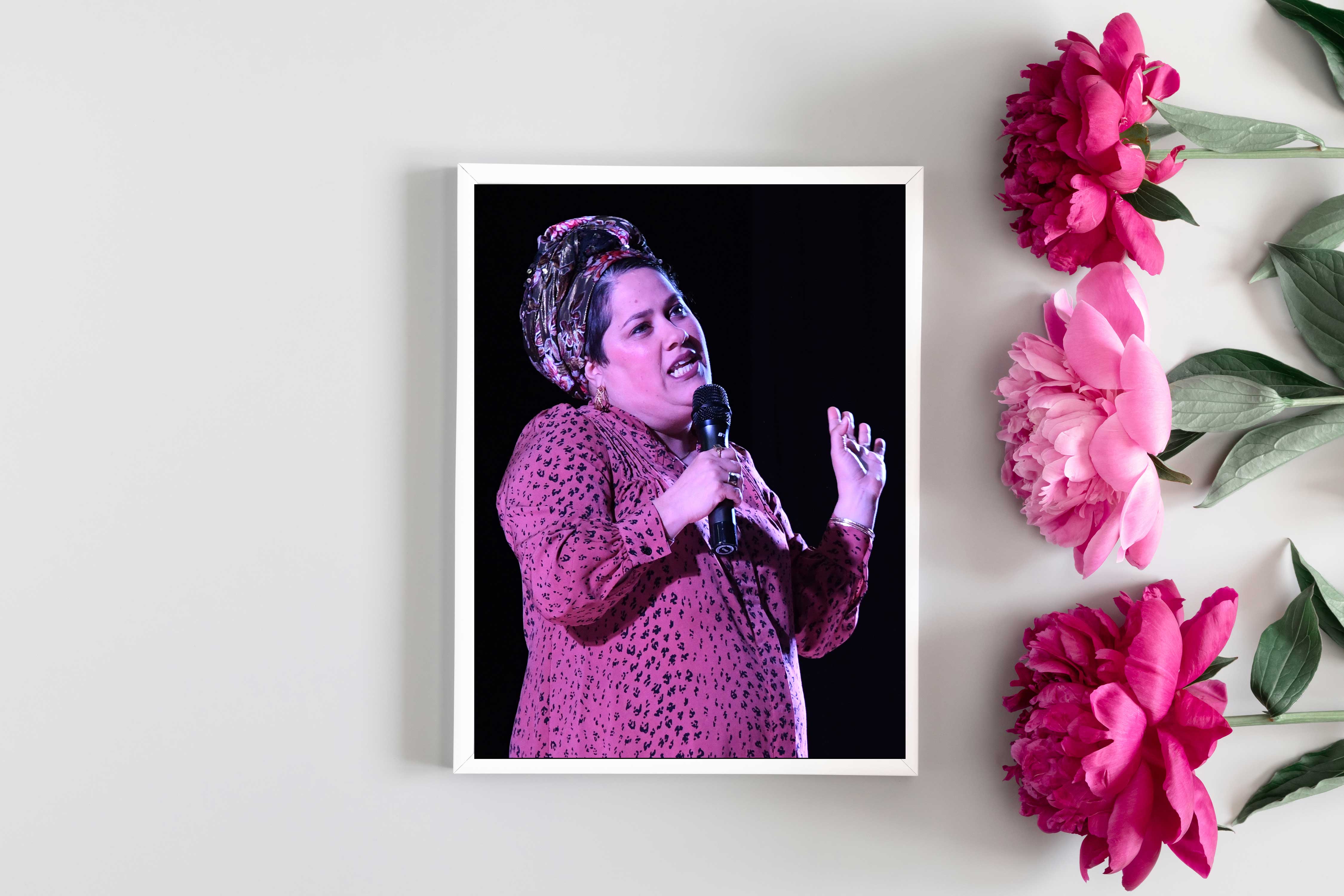Hana Cohen Aloro: "The Rebbetzin Kook Told Me: 'You Must Perform'"
She nearly lost her son and career to COVID, lives under constant fire in the Gaza envelope, yet chooses to face it all with humor. No, she is not a stand-up comedian. Special interview.
 Hana Cohen Aloro
Hana Cohen AloroLiving in Shokeda, a moshav located in the Gaza envelope, every time there are rockets fired in the south, Hana Cohen Aloro faces a conflict: Should she leave until the danger passes, or stay to help those who might need it? Of course, each time this happens, the safety of her six children is also a concern, but it seems that this time, during recent interceptions, the decision of Hana and her husband was more determined than ever: to remain with the IDF soldiers and the residents, offering help to anyone in need.
"Honestly, we didn't exactly know what we were getting into when we moved here," she recalls, "but over time it became a part of our life and awareness, so unlike in the past, this time it was important for us to stay despite the situation. I felt my body telling me 'Stay home, the home needs you,' and in the reality test, I truly felt how it did me good. To pray for the residents of Sderot, whom we felt very keenly, especially during the interceptions, and also to cook for the soldiers. This decision somehow connected to the hardships of the people of Israel. Some people need to disconnect and distance themselves, but for us, in previous times when we chose that, it caused more harm than good, and this time it actually did us good to choose to stay, knowing this is our place, we are here, and we will continue to live here, build here, and grow here."
Hana chose to participate in a crowdfunding campaign to establish a fortified mikveh in Shokeda, which can help local women with the mitzvah of immersion, considered one of the most important commandments in Judaism, during tense security periods. "During one of the rounds of fighting, I immersed under fire, and it was terrifying," she explains. "I understood that it's not that I wouldn't immerse. At the same time, I also knew I couldn't take the risk; I didn't want to die. In our current reality, there's not even a bomb shelter within our mikveh, but we know that the purity of the home and the mitzvah of immersion is the holy of holies for the people of Israel, and therefore it is so dear to me."
"A woman needs to prepare before going to the mikveh, and when you are in a round of fighting, you don't shower properly; everything has to be done in seconds, but a fortified mikveh allows for preparation, giving the immerser a greater sense of security. So, even though I'm not someone who speaks publicly about these matters frequently, I was willing to put my face to it and enlist, and I think it very much sparked inspiration within the people of Israel and offered support. In the end, there was amazing engagement, and we raised over 200,000 shekels. It's a small community, and it was amazing and moving that we raised this amount, truly a privilege."
"Until I Started Performing, I Felt Internal Decay"
In fact, this is not the first time she lives in the dual reality between transitions: between pain and joy, between interceptions and routine, in her performances where she tries to connect the sacred with the mundane, and also between her moments of personal struggle and her mission to go out and make other women happy despite everything. During the coronavirus pandemic, for example, Hana almost lost her son, Amatzia, who suffered from post-COVID syndrome: "I believe that part of the merit of bringing joy to women stood by my son for his healing, and through this challenge, I learned a lot about the importance of seeking health through joy."
At the same time, she also faced a loss of income, which was imposed on her during the extended lockdowns when she couldn't perform, severely affecting many independent artists. "In the end, I simply started performing on Zoom," she describes. "Overall, I often talk about how being independent is a bit like being a farmer. It's very scary. It's a kind of suicide mission. You go on, open registers, produce everything around it, and hope to succeed."
"In moments like those, I keep returning to the point of Joseph the righteous, whose title ‘Righteous, Foundation of the World’ was because he was connected to the foundation. Even from his hardest moments, like when meeting his brothers years after they sold him, he told them: do not fear, for Hashem sent me. He had an amazing ability to connect Hashem to everything. So, I also say: if I was supposed to be a secretary or a teacher, that’s what would have happened, and if I ended up being independent – it turns out that's how my livelihood will come. I strive in great humility to be a vessel, before I go on stage, I say 'Hashem, open my lips and my mouth will declare Your praise.' And if people aren't calling to book performances, I say that’s also from Hashem and talk to Him."
Hana's success story is full of inspiration. She married young and quickly became a mother of five little ones while simultaneously working intensively as a theater director, workshop leader, and more. For years she searched for her place: she started studying and left, and at age 30, a significant turning point occurred. "We lived in a moshav in the Galilee, and Rebbetzin Kook would come to give strength lessons. My friends urged me to attend," she describes. "I was in my ninth month of pregnancy, and as soon as I entered, the Rebbetzin hugged me, lifted me in the air, and gave me a hug I had never received in my life. I began to cry a soul's cry... and from then on, I started coming and not missing any sessions."
"One day, she held a microphone, waved it in front of everyone, and asked who wants to tell us a miracle. For me, it was like: ‘Who wants a stage?’, which I was very connected to. I jumped at the opportunity and went up to share about a matchmaking I was involved in, which succeeded miraculously. That was the first time I went up and performed my material, and the women couldn't breathe from laughter, and even the Rebbetzin herself, and then she asked me to prepare a miracle for each class. Since then, I had a regular spot in her class every session."

"Over time, the Rebbetzin constantly told me how much I strengthen and make others happy, and that I have to perform in front of women. After a while, even her assistant said to me: ‘Look, you’ve accumulated material from all that you’ve shared here, why not try performing with it?’ And from there everything became history: I went for personal and financial coaching, learned how to start a business, created a show with my sister, and later began performing solo. Until I started performing, I felt internal decay. Although it's a brave choice, if I didn't go out and perform, I'd go crazy. In Hasidism, it's said everyone is a channel, and you need to build it for divine flow, and if you don't build it to be clean and hollow and humble – it won't work. Everyone needs to find their mission."
Are you trying to bring Torah through humor, stand-up, and theater? Isn't that challenging?
"I don't try, that's just me. I'm a person with a sense of humor. This doesn't mean I always laugh within the situation, but I at least try to laugh about it afterward. For instance, I have a skit in my show about what happens to many of us at the Shabbat table with our kids, and everyone always cracks up over it. But it's not that when it happens at my Shabbat table, I laugh like that, quite the opposite, I cry. Often the gap between what we want and reality is painful, but I take it and know how to grow from it. Just as people see me and ask me to make them laugh, it doesn't work like that."
"By the way, I don't define myself as a stand-up comedian, but as a comedic actress. A stand-up comedian is someone who knows how to make people laugh, but sometimes it's humiliating or degrading. A comedic actor is something with more depth. My goal is more than just to make people laugh; I've been lecturing on Hasidism for over 8 years, all my shows are based on midrashim and the teachings of the sages, that's also how I started creating: I would study Hasidism and then dream about how to present it in a show. For many years I felt a big disconnect between the sacred and the mundane world, that I couldn't manifest Hashem all the time in my life, and it didn’t make sense to me, and it didn't sit right with me, and from this, I began to create. In my performances, I talk about everything: detoxification, relationships, raising children. Women relate very much, and feel like I was in their home beforehand. I have a large community of hundreds of women who study with me weekly, and there's humor but also deep and moving Torah, and Torah that seeks to connect to life, whether it be the internet, marital arguments, or anything. Trying to connect Hashem to life."
Do you have any special stories from your performances?
"I always talk about how easy it is to get lost in the everyday and forget about the eternal point, and I have a funny skit about this related to childbirth. Once I received a message from someone, who said how it brought her healing and made her feel a mission. Ten months later, she sent me a picture of a baby, and it turned out that she decided to have another child after many years, and after she had already decided not to have more. She wrote to me that I have a share in paradise for that, and that baby brought them so much tenderness and light to their home. It touched me deeply."
Besides this, many women go along with the texts I provide and choose to make changes: change careers, create, overcome the fear of becoming independent. In Torah learning with me, I receive amazing responses from women who started praying again, someone told me that since the lessons she's a better person because Hashem is more present in her life."
"If I could give myself a slogan, it would be 'Hana Cohen Aloro, connecting Hashem to life', this is my mission. Hana means Hashem's grace, showing how much grace Hashem has and how it can bring a different melody to my life, and not everything is good: I'm also irritable, I also love empty carbs, I also have a big stomach, and I always appear pregnant. It's hard for me to hear people say everything is good for them, because that's not the truth, and I'm always seeking truth."
Hana Cohen Aloro was interviewed on the show "Not Taken for Granted" hosted by Moran Kurs. The full episode will air soon.

